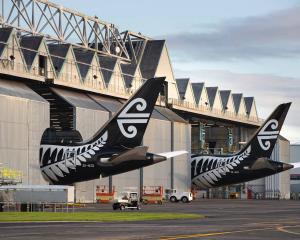Samsung's decision to stop manufacturing its fire-plagued Galaxy Note 7 smartphones immediately resulted in $US18.8 billion ($NZ26.5 billion) being wiped off its market capitalisation on the South Korean stock exchange.
The recall and cancellation of the less than two-month-old Galaxy 7 line was being touted as potentially the most expensive technology safety recall.
Samsung started a recall and replacement programme more than a week ago, but then replacements also started catching fire, prompting widespread safety concerns over the $US880 ($NZ1244) devices and manufacturing was halted on Monday. Refunds or alternative models being offered.
Conversely, while Samsung's shares had their largest percentage decline since 2008, down to $US1350 per share, arch-rival Apple's shares touched a 10-month high of more than $US118, after confirmation the smartphones would be scrapped.
There has been only one confirmed report of a Galaxy 7 catching fire in New Zealand.
Craigs Investment partners broker Peter McIntyre said quitting manufacturing was ''hugely damaging'' to the Samsung brand, aside from the huge financial impact.
''There will be a switch in consumer trust, over to Apple's iPhone,'' he said.
The Dow Jones industrial average index was a ''sea of red''. Apple shares and two others were the only three of the index's 30 components to finish up.
''Apple has benefited, as its closest rival Samsung continues to face issues with its Galaxy,'' he said.
Analysts were predicting a 10% decline in operating profit, but a larger loss off revenues, he said.
Analysts for Bloomberg said with at least 2.5million units being recalled, at a retail price around $US850, they estimated a hit of at least $US2.1billion to start with.
Only a week ago the Samsung brand was ranked as seventh-best in the world by Omnicom's Interbrand, making it worth about $US52billion, up 14% from a year ago, the Bloomberg analysts said.
Forsyth Barr broker Suzanne Kinnaird said Asian markets were led lower overnight on Tuesday by Samsung's plunge.
Asian equities fell and the MSCI Asia Pacific Index lost 0.6%, despite an oil-induced rally failing to outweigh the ''Samsung-induced tech drag'', she said.
''Samsung tumbled 8% in Seoul after the tech company asked retailers to stop sales of its Galaxy Note 7, which have contained exploding batteries,'' Mrs Kinnaird said.
She noted the shares of Samsung suppliers, such as Radiant Opto-Electronics also slumped, by 8.4%.
Samsung's decision to pull Note 7s off the shelves not only raises fresh doubts about the firm's quality control but could result in huge financial and reputational costs, Reuters reported yesterday.
Analysts said a permanent end to Galaxy 7 sales could cost Samsung up to $US17billion and tarnish its other phone products in the minds of consumers and carriers.
''This is the first time that I have seen a product recall go this badly wrong,'' financial analyst Richard Windsor said in a note to clients.
''When it comes to the damage that it will do to Samsung's brand, we are in uncharted territory,'' he said.
The premium device, launched in August, was supposed to compete with Apple's latest iPhone for supremacy in the smartphone market.
Well received by critics, its first problem was a shortage as pre-orders overwhelmed supply.
But within days of the launch images of charred Note 7s began appearing on social media, in the first sign that something was seriously amiss with the gadget.
Samsung, the world's top maker of smartphones, had nearly twice the global market share of Apple at mid-year, having shipped 77.6million phones in the second quarter alone, Neil Mawston, an analyst at research firm Strategy Analytics, said.
The South Korean company was counting on the Note 7 to replace its previous flagship model, the Note 5, which had sold around 15million units for the year to June, according to Strategy Analytics data, Reuters said.
- Additional reporting: Reuters














